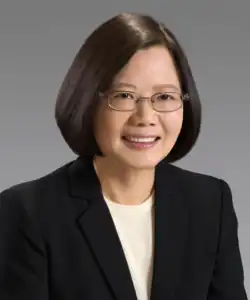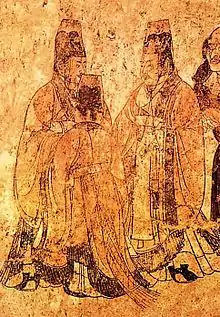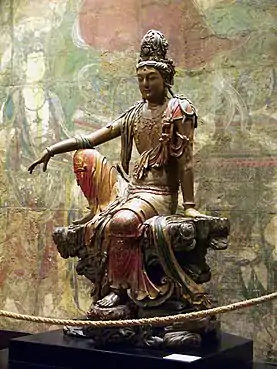Portal:China

Modern China traces its origins to a cradle of civilization in the fertile basin of the Yellow River in the North China Plain. The mythical Three Sovereigns and Five Emperors marks the beginning of a shared identity. The semi-legendary Xia dynasty in the 21st century BCE and the Shang and Zhou dynasties developed a political system to serve hereditary monarchies. Written script was developed and inscription of Bronze and engraving of Oracle bone became common. Classic literature, and the Hundred Schools of Thought emerged during this period and influenced the region and beyond for centuries to come. In the third century BCE, the Qin dynasty ended the Spring and Autumn and Warring States period when Qin Shi Huangdi assumed the self-invented title of Huangdi (Emperor of China). Fractured by the uprising peasants, the Qin was replaced by Liu Bang's Han dynasty (206 BCE–220 CE). Together they laid the foundation for a political tradition of nearly two millennia in which the Chinese empire was one of the world's foremost economic powers. The empire expanded, fractured, and reunified; absorbed foreign religions and ideas; and made world-leading scientific advances, such as the Four Great Inventions: gunpowder, paper, the compass, and printing. After centuries of disunity following the fall of the Han, the Sui (581–618) and Tang (618–907) dynasties reunified the empire. The Tang welcomed foreign trade and culture over the Silk Road and adapted Buddhism to their needs. The early modern Song dynasty (960–1279) became urban and commercial while the civilian scholar-officials or literati adopted the examination system and the doctrines of Neo-Confucianism to replace the military aristocrats of earlier dynasties. The Mongol established the Yuan dynasty in 1279 before the Ming dynasty (1368–1644) re-established Han Chinese control. The Manchu-led Qing dynasty affirmed its control further and established the basis for the modern Chinese nation, although subsequently suffered significant losses to European imperialism in the 19th century. China is a unitary socialist republic led by the CCP. It is one of the five permanent members of the UN Security Council and a founding member of several multilateral and regional organizations such as the Asian Infrastructure Investment Bank, the Silk Road Fund, the New Development Bank, the Shanghai Cooperation Organisation, and the RCEP. It is also a member of the BRICS, the G8+5, the G20, the APEC, and the East Asia Summit. China ranks poorly in measures of democracy, transparency, press freedom, religious freedom, and ethnic equality. The Chinese authorities are often criticized for human rights abuses. Making up around one-fifth of the world economy, China is the world's largest economy by GDP at purchasing power parity, the second-largest economy by nominal GDP, and the second-wealthiest country. The country is one of the fastest-growing major economies and is the world's largest manufacturer and exporter, as well as the second-largest importer. China is a nuclear-weapon state with the world's largest standing army by military personnel and the second-largest defense budget. (Full article...)
|
 |
Here are some tasks awaiting attention:
|
China's Politics


The General Secretary of the Chinese Communist Party, officially General Secretary of the Central Committee of the Communist Party of China, is head of the Chinese Communist Party and the highest-ranking official within China, a standing member of the Politburo and head of the Secretariat. The officeholder is usually considered the paramount leader of China.
According to the Constitution, the General Secretary serves as an ex officio member of the Politburo Standing Committee, China's de facto top decision-making body. Since the early 1990s, the holder of the post has been, except for transitional periods, the Chairman of the Central Military Commission, making the holder the Commander-in-chief of the People's Liberation Army.
The current General Secretary is Xi Jinping (picture), who took the office at the 18th National Congress on 15 November 2012.


The President of the Republic of China is the head of state of the Republic of China (ROC).
The Constitution names the president as head of state and commander-in-chief of the Republic of China Armed Forces (formerly known as the National Revolutionary Army). The president is responsible for conducting foreign relations, such as concluding treaties, declaring war, and making peace. The president must promulgate all laws and has no right to veto. Other powers of the president include granting amnesty, pardon or clemency, declaring martial law, and conferring honors and decorations.
The current President is Tsai Ing-wen (picture), since May 20, 2016. The first woman to be elected to the office, Tsai is the seventh president of the Republic of China under the 1947 Constitution and the second president from the Democratic Progressive Party (DPP).
Related WikiProjects
 |
You are invited to participate in WikiProject China, a WikiProject dedicated to developing and improving articles about China. ~~~~ |
- Parent projects
- WikiProject Asia
- WikiProject East Asia
- WikiProject Countries
- Main projects
- WikiProject China
- Sub-projects and task forces
- Cartography
- Chinese surnames
- Cinema
- CJKV
- Entertainment
- Go (board game)
- History
- Military history
- Politics
- Three Kingdoms
- Cities
- Pearl River Delta
- Provinces
- Hong Kong
- Macau
- Taiwan
- Tibet
- Transportation
- Related projects
- Buddhism
- Christianity
- Martial arts
- Taoism
Wikipedias in languages found in China
粵語 / 广东话 (Cantonese) •
古文 / 文言文 (Classical Chinese) •
赣语 (Gan) •
Hak-kâ-fa (Hakka) •
قازاق تىلى (Kazakh) •
中文 / 普通话 (Mandarin) (Now unable to access in
China Mainland because of the GFW) •
闽东语 (Min Dong) •
闽南语 (Min-nan) •
བོད་ཡིག (Tibetan) •
ئۇيغۇرچە (Uyghur) •
吴语 (Wu) •
Sawcuengh (Zhuang)
Associated Wikimedia
The following Wikimedia Foundation sister projects provide more on this subject:
-
 Commons
Commons
Free media repository -
 Wikibooks
Wikibooks
Free textbooks and manuals -
 Wikidata
Wikidata
Free knowledge base -
 Wikinews
Wikinews
Free-content news -
 Wikiquote
Wikiquote
Collection of quotations -
 Wikisource
Wikisource
Free-content library -
 Wikiversity
Wikiversity
Free learning tools -
 Wikivoyage
Wikivoyage
Free travel guide -
 Wiktionary
Wiktionary
Dictionary and thesaurus
-
 List of all portalsList of all portals
List of all portalsList of all portals -
 The arts portal
The arts portal -
 Biography portal
Biography portal -
 Current events portal
Current events portal -
 Geography portal
Geography portal -
 History portal
History portal -
 Mathematics portal
Mathematics portal -
 Science portal
Science portal -
 Society portal
Society portal -
 Technology portal
Technology portal -
 Random portalRandom portal
Random portalRandom portal -
 WikiProject PortalsWikiProject Portals
WikiProject PortalsWikiProject Portals





.png.webp)



.svg.png.webp)















.jpg.webp)



_with_human_faces.jpg.webp)



.png.webp)




















_-_1958.213.b_-_Cleveland_Museum_of_Art.jpg.webp)


.jpg.webp)










.svg.png.webp)






.jpg.webp)






-111425_(24150640974).jpg.webp)

